Having worked closely with builders, contractors, and CRM implementation teams for 10+ years, I’ve observed how the right construction CRM can make or break construction workflows.
For any construction company, I know how chaotic things can get—juggling leads, managing subcontractors, following up on bids, and trying to keep clients in the loop. This is where a construction-focused CRM helps you centralize contacts, automate tasks, sync field and office data, and offer real-time project visibility.
In this blog, I’ll list my Top 7 CRM tools for construction companies in 2026, along with key insights on how to choose the best one for your business. Whether you’re managing roofing jobs, handling commercial builds, or scaling your residential crew, this guide will help you pick your ideal CRM.
What Is Construction CRM Software?
Construction CRM software is a customer relationship management tool designed specifically for contractors, builders, and construction firms to manage leads, client communications, job tracking, and project data in one place. Unlike generic CRM for contractors, it supports construction-specific workflows like bidding, estimating, and subcontractor coordination.
These tools often integrate with calendars, email, and construction platforms like Procore or QuickBooks, giving teams in the field and office a shared view of jobs, clients, and timelines.
For example, a roofing contractor can use a CRM for construction to capture leads from their website, tag them by project type (e.g., residential or commercial), and assign follow-up tasks to sales reps. As the deal progresses, the CRM tracks estimates sent, site visits scheduled, and contract statuses, ensuring nothing falls through the cracks.
Quick Overview: My Top 3 Best CRM for Construction
If you’re short on time, here’s a quick look at my top 3 picks for the best CRM for construction:
1. BIGContacts
BIGContacts CRM is the best CRM for small construction businesses, enabling email marketing for startups and SMBs. It offers robust features for managing client interactions and marketing campaigns, making it a solid choice for construction businesses.
2. JobNimbus
JobNimbus is a CRM for construction industry and project management platform tailored primarily for roofing, siding, gutter, and exterior contractors.
It centralizes lead capture, bid and estimate generation, job scheduling, photo documentation, and invoicing—all accessible via a mobile‑friendly dashboard and customizable Kanban-style boards.
3. Pipedrive
Pipedrive is a flexible, sales-focused CRM that suits construction teams by offering customizable pipelines, intuitive drag-and-drop job stages, and mobile access for field staff.
It centralizes project leads, emails, calls, and activity tracking in one place, ensuring that follow-ups are not missed, even on job sites.
My Top 7 Best CRM for Construction Businesses
I’ve gathered a list of my top best 7 CRM tools for construction businesses. These tools provide advanced features to help you enhance your customer relationships.
With these tools, your construction business can achieve higher efficiency and customer loyalty. Here’s a quick summary of my top 7 best CRM for construction:
| Best Construction CRM Software | Best for | Pricing | G2 Rating |
|---|---|---|---|
| BIGContacts | Contact Management & Email Marketing for Startups & Small & Medium Businesses | A Forever Free Plan is available with up to 100 contacts. Paid plan starts at$9.99/month | 4.5/5 |
| JobNimbus | Roofing Business CRM | Offers custom pricing | 4.7/5 |
| Pipedrive | Sales-Focused Teams | Paid plan starts at $14/seat/month | 4.3/5 |
| Acculynx | Roofing Project Management | Offers custom pricing | 4.4/7 |
| Contractor Foreman | Construction Management | Paid plan starts at $49/month | 4.5/5 |
| Basis Board/Down to Bid | Bid Management | Offers custom pricing | NA |
| Nimble CRM | Social Media Integration & Contact Management | Starts at $24.90/seat/month | 4.5/5 |
1. BIGContacts – Best for Contact Management & Email Marketing for Startups & Small & Medium Businesses
In my experience, BIGContacts truly stood out as the best CRM for contractors, thanks to its powerful features that simplified client relationship management. The contact management system made it easy to store and organize every client detail.
This helped me to easily track ongoing projects and manage communication with contractors and suppliers. The integrated email marketing tools were a significant advantage. With this tool, I could send personalized emails directly from the CRM, which strengthened my client relationships.
Automated follow-ups and task reminders were invaluable for consistently meeting deadlines, which is crucial in the construction industry. The system’s custom fields also allowed me to adapt the CRM to specific construction project needs, making it an essential tool for managing both small and large projects.
Pros:
- A 360° customer profile that brings together tasks, events, files, notes, and social media profiles in one centralized hub
- Improved data management through the use of tags, lists, comments, and groupings to keep everything organized
- Advanced reporting tools that offer a clear summary of activities
- Streamlined workflows and automated recurring tasks to enhance the efficiency of sales and marketing operations.
G2 Rating:
4.5/5
Pricing:
A Forever Free Plan is available with up to 100 contacts. Paid plan starts at $9.99/1000 contacts/month.
Let me show you a real-life example of how a feature-rich CRM like BIGContacts can save you from data-entry chaos:

2. JobNimbus – Best for Roofing Business CRM
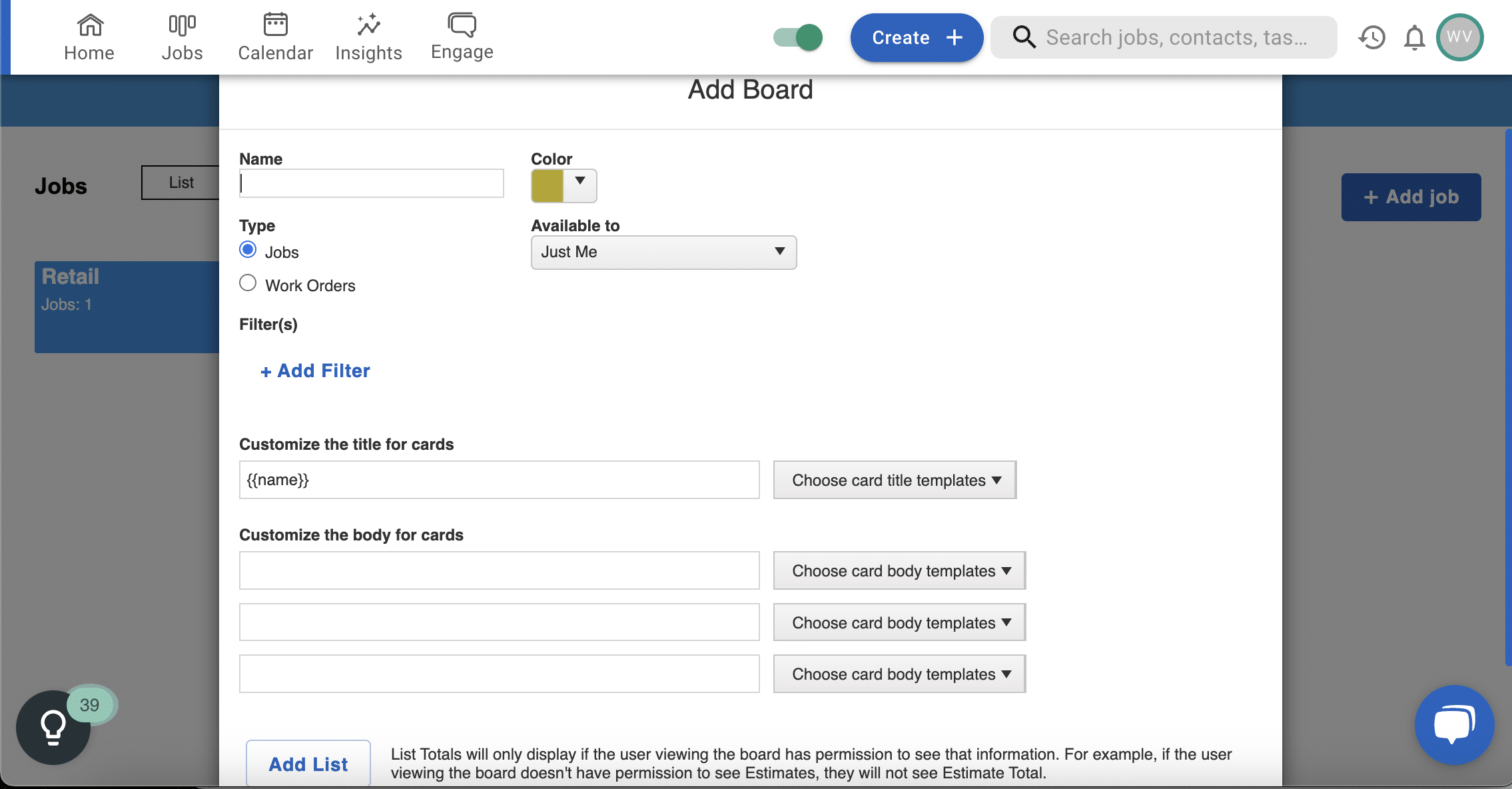
JobNimbus seamlessly integrates lead tracking, task management, and document organization, enabling contractors to manage their operations efficiently from initial contact through project completion and billing. With its user-friendly interface and robust mobile app, JobNimbus ensures that office staff and field teams stay connected and informed in real time.
The platform’s customizable workflows allow contractors to adapt the software to their unique business processes. Whether it’s scheduling tasks, setting reminders, or automating follow-ups, JobNimbus provides the flexibility needed to streamline operations and reduce manual workload.
Pros:
- Seamless integration with tools like QuickBooks, EagleView, and CompanyCam further enhances its utility by consolidating various aspects of business management into a single platform
- Customizable workflows to tailor the software to fit your specific business processes and project requirements
- Utilize built-in texting, emailing, and caller ID to maintain seamless client interactions.
G2 Rating:
4.7/5
Pricing:
Offers custom pricing.
3. Pipedrive – Best for Sales-Focused Teams

What immediately caught my attention about Pipedrive was how effortlessly it transformed complex sales processes into a simple, visual journey. The intuitive drag-and-drop interface helped me to visualize the entire sales process clearly.
Each stage of the pipeline was customizable, making it easy to adapt to the specific needs of different projects. I liked the automated follow-up reminders, which ensured that no lead fell through the cracks. When working with construction businesses, Pipedrive’s ability to manage multiple pipelines simultaneously proved invaluable.
Its project management features, like task assignments and deadlines, were especially helpful in keeping construction projects on track. Pipedrive also offered effective reporting tools that provided insights into sales performance, which could be easily tailored to track construction project milestones.
Pros:
- AI Sales Assistant to provide predictive insights on which deals are likely to close
- Custom fields to capture unique data points tailored to specific business needs
- Customizable Kanban-style pipelines visualize the sales funnel for easy management.
G2 Rating:
4.3/5
Pricing:
Paid plan starts at $14/seat/month.
4. Acculynx – Best for Roofing Project Management
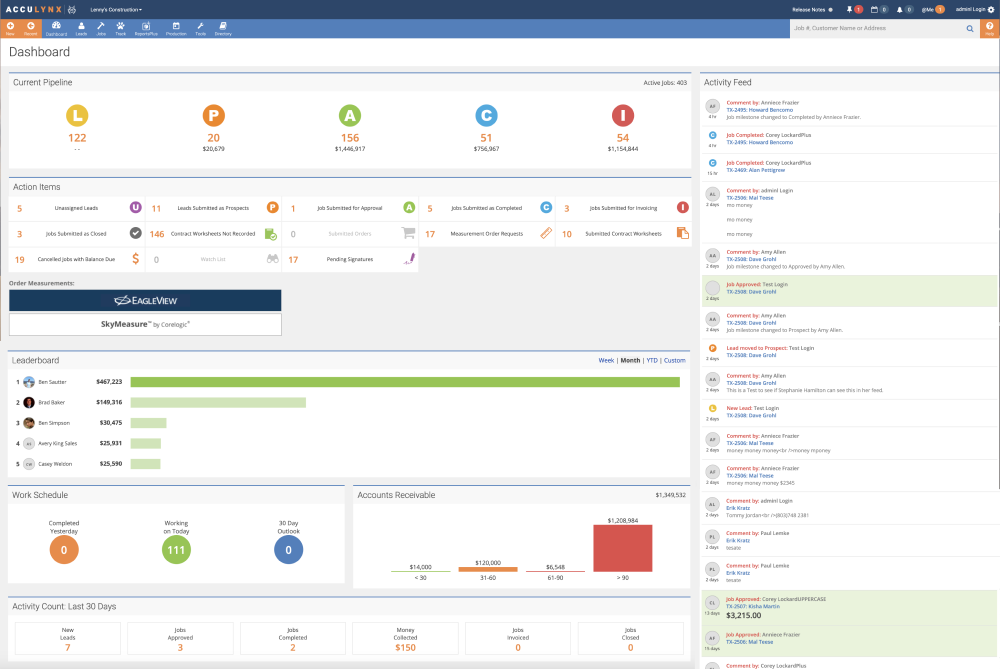
Using Acculynx was a real boost for managing my roofing projects. It offered a full suite of features designed specifically for the construction industry. I could easily track leads, create estimates, and manage customer relationships, all within one platform.
I was surprised by how simple it made job scheduling and material tracking. The entire team stayed in sync, which made a huge difference. Since Acculynx is cloud-based, I could access everything remotely, adding flexibility to my workday.
Its document management and financial tracking tools really streamlined the process, making it one of the suitable options for a construction CRM. It helped ensure that every aspect of the project was under control and nothing slipped through the cracks.
Pros:
- Lead and sales pipeline tracking to help you close deals faster and maintain clear visibility over your sales funnel
- Directly integrates with aerial measurement tools, providing accurate estimates for better project planning
- Job costing features to help you maintain budget control and maximize profitability.
G2 Rating:
4.4/5
Pricing:
Offers custom pricing.
5. Contractor Foreman – Best for Construction Management
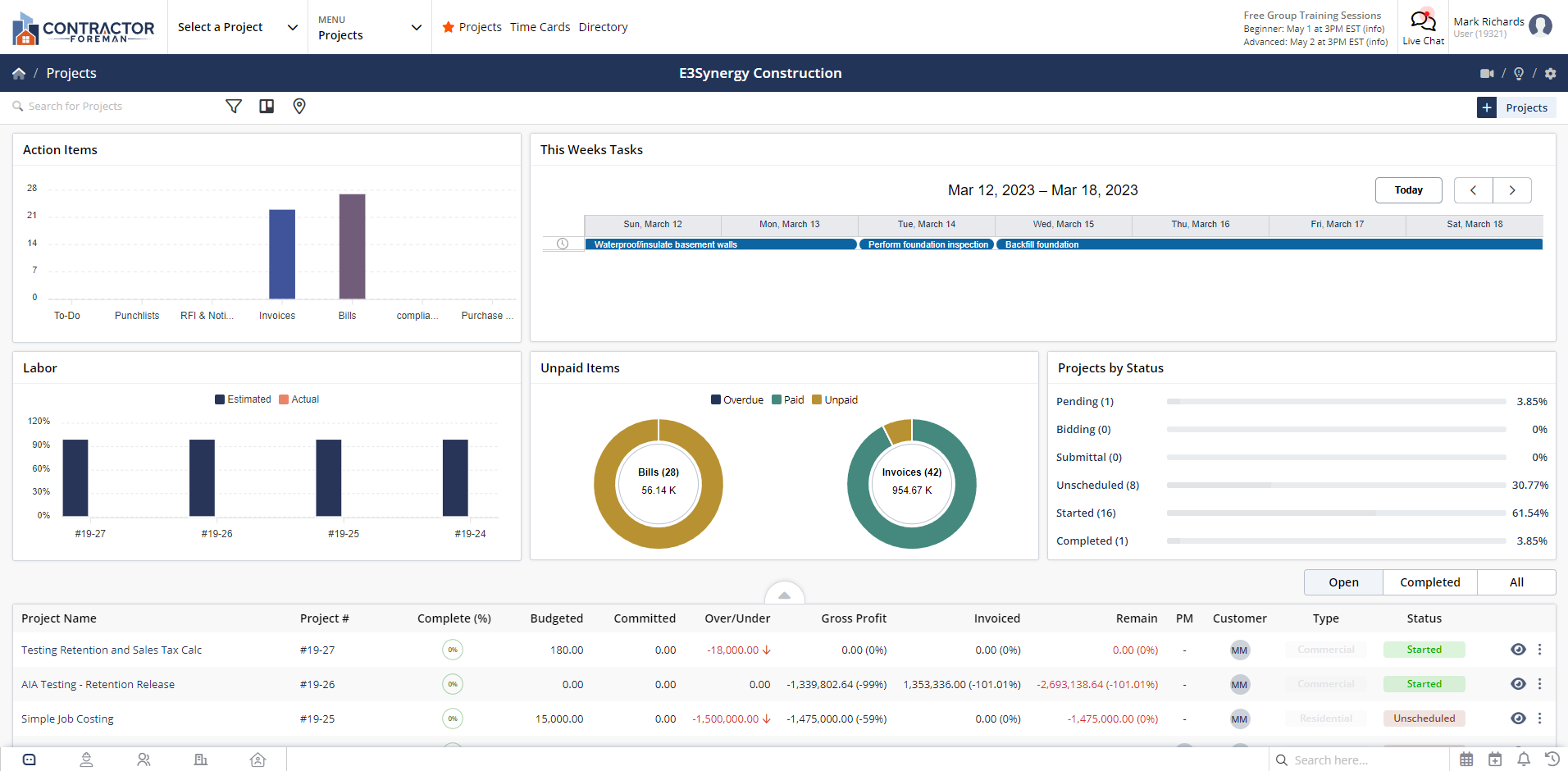
Contractor Foreman excels in providing features tailored to the construction industry, including bid management, scheduling, job costing, and time tracking. Its intuitive interface allows contractors to manage projects efficiently, from initial estimates to final invoicing.
The platform also emphasizes safety and compliance, offering modules for incident reporting, safety meetings, and equipment tracking. These features help contractors maintain regulatory standards and ensure workplace safety.
The software’s document management system also allows for easy storage and retrieval of project-related files, facilitating better collaboration among team members. It also provides a client portal where clients can view project progress and invoices and communicate directly with the team.
Pros:
- Manage projects on the go with robust mobile applications for both iOS and Android
- Seamless integration with QuickBooks and Stripe for efficient financial management.
- Enhance client communication and satisfaction through a dedicated portal for project updates and invoicing.
G2 Rating:
4.5/5
Pricing:
Paid plan starts at $49/month.
6. Basis Board/Down to Bid – Best for Bid Management
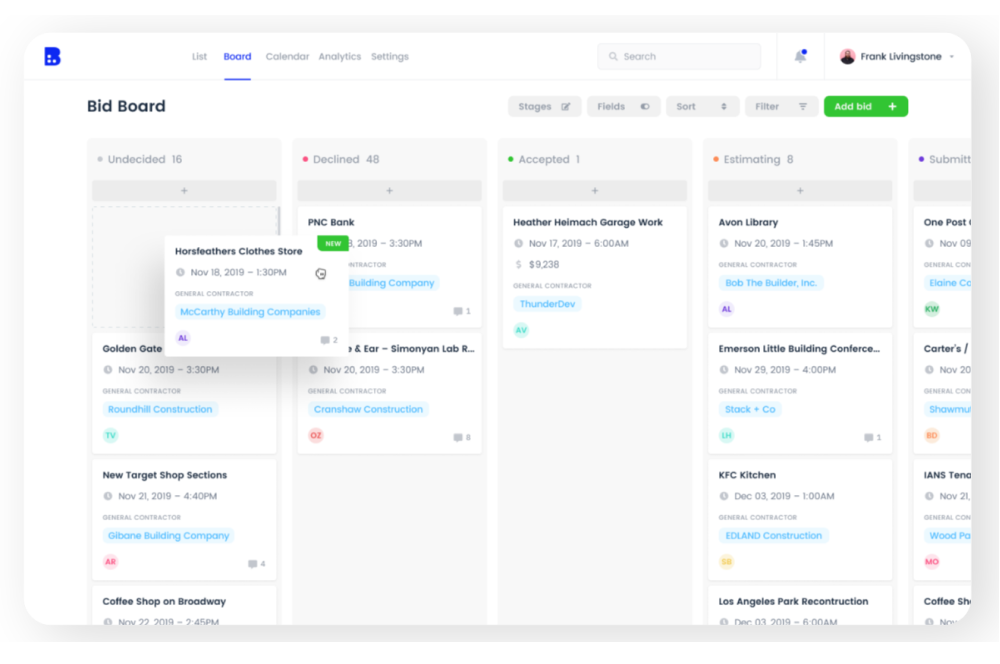
What immediately impressed me about BasisBoard was its unique ability to streamline bid management by automatically pulling bid opportunities from various sources. This tool was specifically designed with construction professionals in mind, making it an excellent CRM for construction.
I liked how it centralized all bid-related activities, helping me effortlessly track, manage, and collaborate on bids. The integration with popular construction software was also impressive, eliminating the need for manual data entry.
The automated bid tracking feature was particularly useful, as it kept me informed about every stage of the bid process. BasisBoard offered essential features for construction businesses, like document management, team collaboration, and real-time updates, ensuring that every project bid was handled efficiently.
Pros:
- Ability to automatically organize bid invites by location, specialty, and trade, saving time on sorting
- Ability to sync bid data with existing construction management software for seamless integration
- Real-time bid tracking with visual indicators for deadlines and status changes.
G2 Rating:
NA
Pricing:
Offers custom pricing
7. Nimble CRM – Best for Social Media Integration & Contact Management
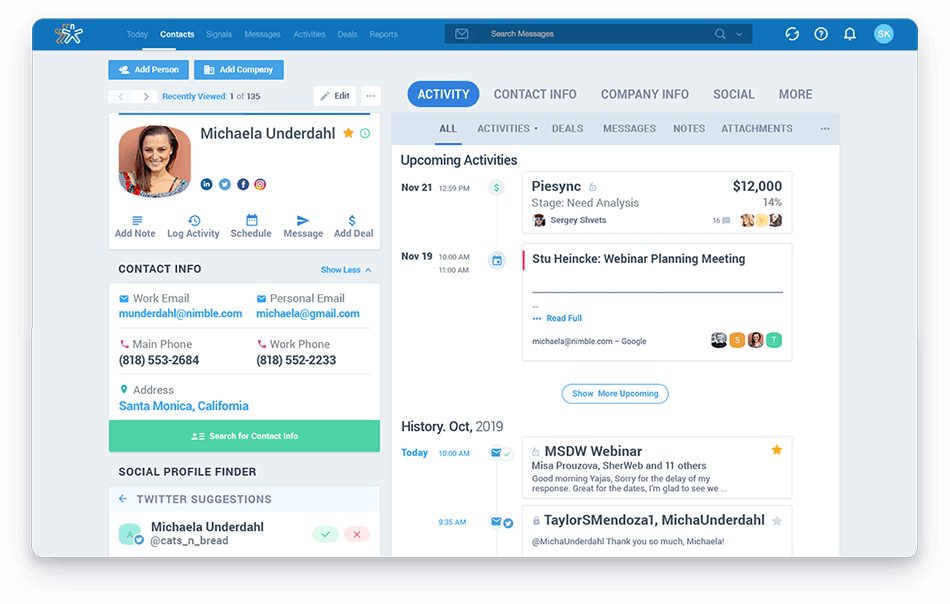
Managing contacts felt effortless with Nimble CRM—it was like having a personal assistant who kept everything organized for me. It offered a straightforward approach to organizing and nurturing relationships, making my daily tasks much smoother.
The Smart Contacts feature really stood out. It effortlessly pulled in detailed profiles from social media and other sources, keeping me up-to-date with my contacts without any extra work. What I appreciated most was Nimble’s easy integration with my email and social accounts.
As a CRM for builders, Nimble was useful. Its ability to track communication history and segment contacts by project made it easy to manage relationships with subcontractors, suppliers, and clients. This ensured that all my communications were organized in one place, helping me keep everything on track and avoid any oversights.
Pros:
- Advanced segmentation features to target contacts based on specific attributes
- Seamless email tracking and templating to personalize outreach campaigns
- Built-in task and calendar integration to ensure timely follow-ups and task management.
G2 Rating:
4.5/5
How to Choose the Best Construction CRM Tool
Choosing the right construction CRM software can streamline your projects, boost team coordination, and improve client relationships.
Here’s a quick overview of key factors to help you find the best fit for your business:
| Factor | Why It Matters | What to Look For |
| Industry-Specific Features | Construction needs are different from general CRM use cases | Job tracking, bid/estimate tools, project folders, subcontractor support |
| Ease of Use | Your team (especially on-site) needs something intuitive and fast to adopt | Clean interface, minimal learning curve, mobile-friendly dashboards |
| Mobile Accessibility | Field crews need CRM access on job sites or in transit | Native iOS/Android apps, offline access, real-time sync |
| Customization & Flexibility | Every construction firm has unique workflows and terminology | Custom fields, tag-based sorting, workflow automation |
| Integration Capabilities | Syncing with existing tools saves time and avoids data silos | QuickBooks, Procore, Outlook, Google Calendar, and estimating software integrations |
| Project & Client Tracking | Visibility into leads, jobs, and communications is essential for delivery success | Contact timelines, lead pipelines, task assignments, document storage |
| Team Collaboration | Multiple team members often work on the same job/project | Multi-user access, permissions, shared task lists, internal messaging |
| Pricing & Scalability | Costs must align with your company size and growth plans | Tiered pricing, flexible contact limits, add-on modules as you grow |
| Support & Onboarding | Help is critical for busy teams with limited tech time. | Live chat, tutorials, setup support, knowledge base |
Watch this insightful video to learn more:
Do Smarter Bidding & Project Execution With Construction CRM
Finding the right construction CRM can transform how your team manages leads, schedules projects, communicates with clients, and tracks job progress. In this blog, we explored what construction CRMs are, reviewed the top tools for 2025, and laid out the most important factors to consider when choosing one.
Each CRM has its strengths—from robust mobile access to built-in estimating tools—but the best option ultimately depends on your specific business needs, team size, and workflow preferences. Whether you’re a general contractor or a specialty firm, aligning the tool with your operations is key to maximizing ROI.
BIGContacts stands out as a powerful yet easy-to-use CRM that adapts seamlessly to growing construction businesses. It offers AI-powered contact management, intelligent follow-up reminders, calendar integrations, and automated workflows, making it ideal for teams that want smarter tools without the complexity.
Frequently Asked Questions
What features should a CRM for the construction industry include?
A CRM for the construction industry should include features like project tracking, client management, and scheduling. You’ll also want integration with communication tools, document management, and reporting capabilities. These features help you stay organized, keep projects on track, and ensure smooth communication with your team and clients, making your workday much easier.
Why do construction companies need a CRM?
Construction companies need a CRM to keep everything organized, from managing client relationships to tracking project details. It helps you stay on top of tasks, ensures smooth communication, and ultimately delivers projects on time. With the right CRM, like BIGContacts, you can streamline your operations and focus more on building, not just managing.
How does a contractor CRM software benefit construction professionals?
Using contractor CRM software streamlines your project management, helping you stay organized and efficient. It keeps all your client details, project updates, and schedules in one place, making communication smoother and reducing errors. This software saves you time and hassle, letting you focus on what you do best—delivering quality work on-site.
FREE. All Features. FOREVER!
Try our Forever FREE account with all premium features!








